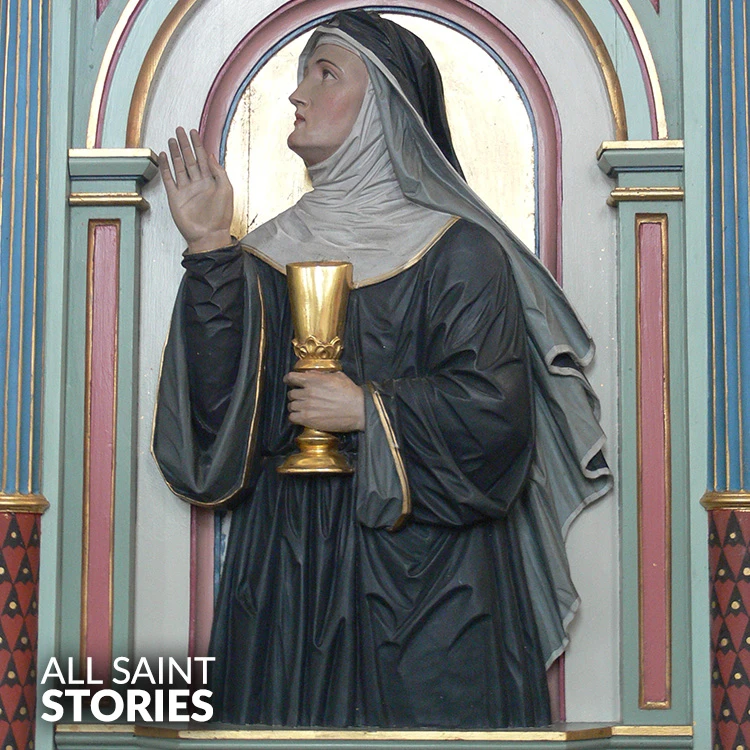St. Mechtilde, you experienced deep and profound spiritual union with God through prayer, meditation, and mystical experiences. May your example inspire us to seek God with the same intensity, devotion, and humility. Help us to open our hearts to His divine presence and draw closer to His eternal love through prayer and contemplation. Amen.
ST. MEHTILDE OF MAGDEBURG
ST. MEHTILDE OF MAGDEBURG

St. Mechtilde of Magdeburg was a 13th-century German mystic and visionary known for her intense spiritual experiences and writings, particularly her work The Flowing Light of the Godhead, which reveals her deep union with God.
St. Mechtilde of Magdeburg was born around 1207 in the region of Magdeburg, Germany. From a young age, she was drawn to the spiritual life, feeling a deep call to devote herself to God. She joined the Beguine community, a lay religious movement that allowed women to live a life of prayer and service while remaining outside the traditional cloistered convents. The Beguines were known for their strong spirituality, and St. Mechtilde’s intense mystical experiences would eventually mark her as one of the most renowned mystics of the 13th century.
Throughout her life, St. Mechtilde experienced profound spiritual visions and mystical encounters, which she believed were gifts from God. These visions often centered around the love of God and the union of the soul with the Divine. Her deep prayer life and meditative nature led her to seek an intimate relationship with Christ, and her writings reveal the intensity of her spiritual journey.
One of her most significant contributions to Christian mysticism is her work The Flowing Light of the Godhead, a spiritual text that captures her mystical experiences, prayers, and reflections. This work, which was dictated by Mechtilde to her sisters, provides a window into her inner life and serves as an important text in the development of medieval Christian mysticism. It emphasizes the intimate love of God and the longing of the soul to be united with the Divine.
Her mystical experiences often focused on Christ’s suffering, and she meditated deeply on His passion and how it revealed God’s love for humanity. St. Mechtilde’s writings have been a source of inspiration for many in their spiritual journeys, and her deep devotion to the Eucharist, as well as her understanding of God’s love, has influenced many other mystics and spiritual writers.
St. Mechtilde died in 1282, and although she was not formally canonized by the Church, her profound influence as a mystic and writer continues to be felt. She is venerated as a saint by many, particularly for her contributions to Christian mysticism.
Video Not Found
The information on this website is compiled from various trusted sources. While we aim for accuracy, some details may be incomplete or contain discrepancies.
If you notice any errors or have additional information about this saint, please use the form on the left to share your suggestions. Your input helps us improve and maintain reliable content for everyone.
All submissions are reviewed carefully, and your personal details will remain confidential. Thank you for contributing to the accuracy and value of this resource.
Credits & Acknowledgments
- Anudina Visudhar (Malayalam) – Life of Saints for Everyday
by Msgr. Thomas Moothedan, M.A., D.D. - Saint Companions for Each Day
by A. J. M. Mausolfe & J. K. Mausolfe - US Catholic (Faith in Real Life) – Informational articles
- Wikipedia – General reference content and images
- Anastpaul.com – Saint images and reflections
- Pravachaka Sabdam (Malayalam) – Saint-related content and insights
We sincerely thank these authors and platforms for their valuable contributions. If we have unintentionally missed any attribution, please notify us, and we will make the correction promptly.
If you have any suggestion about ST. MEHTILDE OF MAGDEBURG
Your suggestion will help improve the information about this saint. Your details will not be disclosed anywhere.
© 2026 Copyright @ www.allsaintstories.com




 English
English
 Italian
Italian
 French
French
 Spanish
Spanish
 Malayalam
Malayalam
 Russian
Russian
 Korean
Korean
 Sinhala
Sinhala
 Japanese
Japanese
 Arabic
Arabic
 Portuguese
Portuguese
 Bantu
Bantu
 Greek
Greek
 German
German
 Dutch
Dutch
 Filipino
Filipino